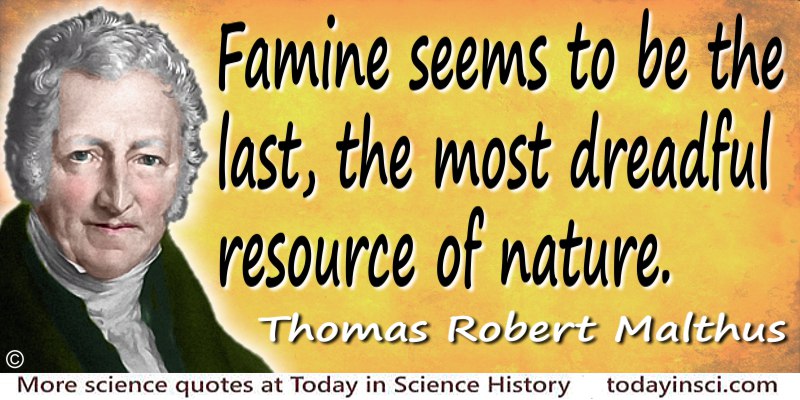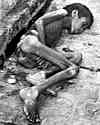 (source)
(source)
|
Thomas Robert Malthus
(13 Feb 1766 - 23 Dec 1834)
English economist and demographer who published his theories, an early systematic analysis of human society, in An Essay on the Principle of Population. He quantified the rates of increase of population versus food supply, and the consequences.
|
Thomas Robert Malthus
“Famine … the most dreadful resource of nature.”
Illustrated Quote - Large (800 x 400 px)
More Thomas Robert Malthus quotes on science >>
When Thomas Malthus first published his famous essay in 1798, the book carried the title An Essay on the Principle of Population: As it Affect the Future Improvement of Society with Remarks On the Speculations of Mr. Godwin, M. Condorcet, and Other Writers. It had nineteen chapters.
Malthus began Chapter 7 musing on the probable cause of epidemics. He expressed relief that the plague seemed “at length to be completely expelled from London.” He used tables of population statistics of births and burials in several foreign countries to make various fact-based observations. The quote above comes in the concluding remarks of the chapter, which he finished by writing:
“[p.139] Famine seems to be the last, the most dreadful resource of nature. The power of population is so superior to the power in the earth to produce subsistence for man, that premature death must in some shape or other visit the human race. The vices of mankind are active and able ministers of depopulation. They are the precursors in the great army of destruction; and often finish the dreadful work themselves. But should they fail in this war of extermination, sickly seasons, [p.140] epidemics, pestilence, and plague, advance in terrific array, and sweep off their thousands and ten thousands. Should success be still incomplete; gigantic inevitable famine stalks in the rear, and with one mighty blow, levels the population with the food of the world.
Must it not then be acknowledged by an attentive examiner of the histories of mankind, that in every age and in every State in which man has existed, or does now exist,
That the increase of population is necessarily limited by the means of subsistence.
That population does invariably increase when the means of subsistence increase. And,
[p.141] That the superior power of population is repressed, and the actual population kept equal to the means of subsistence by misery and vice.”
By 1803, Malthus published a “New Edition, Very Much Enlarged,” with an enlarged title, too: An Essay on the Principle of Population; Or, A View of Its Past And Present Effects on Human Happiness; With an Enquiry Into Our Prospects Respecting the Future Removal or Mitigation of the Evils Which It Occasions.” He had spent the years since his first publication, gathering more materials and information, then spending more time thinking about the subject.
It is interesting to compare his extended thoughts following the above quote in the New Edition. His topics were printed in one bound volume, split into four section, which were called books within the volume. Book I was headed “Of the Checks to Population in the Less Civilized Parts of the World, and in Past Times.” Its fourteen chapters included American Indians, Islands of the South Sea, Africa, Turkish dominions and Persia, Indostan and Tibet, China and Japan, the Greeks, and the Romans.
Book II was headed “Of the Checks to Population in the Different States of Modern Europe.” Chapter XI, the last in Book II, was titled “General Deductions from the Preceding View of Society.” The quote above then came at the end of that chapter. Notice a subtle addition in the first paragraph, “unless arrested by the preventative check.” He now wrote:
“[p.350] Famine seems to be the last, the most dreadful resource of nature. The power of population is so superior to the power in the earth to produce subsistence for man, that, unless arrested by the preventive check, premature death must in some shape or other visit the human race. The vices of mankind are active and able ministers of depopulation. They are the precursors in the great army of destruction, and often finish the dreadful work themselves. But should they fail in this war of extermination, sickly seasons, epidemicks, pestilence, and plague, advance in terrifick array, and sweep off their thousands and ten thousands. Should success be still incomplete, gigantick inevitable famine stalks in the rear, and, with one mighty blow, levels the population with the food of the world.
Must it not then be acknowledged, by an attentive examiner of the histories of mankind, that, in every age, and in every state, in which man has existed, or does now exist,
The increase of population is necessarily limited by the means of subsistence.
Population invariably increases when the means of subsistence increase, unless prevented by powerful and obvious checks.
These checks, and the checks which keep the population down to the level of the means of subsistence, are, moral restraint, vice, and misery.
In comparing the state of society which has been considered in this second book with that which formed the subject of the first, I think it appears, that in modern Europe the positive checks to population prevail less, and the preventive checks more, than in past times, and in the more uncivilized parts of the world.
War, the predominant check to the population of savage nations, has certainly abated, even including the late unhappy revolutionary contests: and since the prevalence of a greater degree of personal cleanliness, of better modes of clearing and building towns, and of a more equable distribution of the products of the soil from improving knowledge in political economy, plagues, violent diseases, [p.351] and famines, have been certainly mitigated, and have become less frequent.
With regard to the preventive checks to population, though it must be acknowledged, that moral restraint does not at present prevail much among the male part of society; yet I am strongly disposed to believe that it prevails more than in those states which were first considered; and it can be scarcely doubted that in modern Europe, a much larger proportion of women pass a considerable part of their lives in the exercise of this virtue, than in past times and among uncivilized nations. But however this may be, taking the preventive check in its general acceptation, as implying an infrequency of the marriage union from the fear of a family, without reference to its producing vice, it may be considered, in this light, as the most powerful of the checks, which in modern Europe keep down the population to the level of the means of subsistence.”
- Science Quotes by Thomas Robert Malthus.
- 13 Feb - short biography, births, deaths and events on date of Malthus's birth.
- Thomas Robert Malthus - context of quote “Famine … the most dreadful resource of nature.” - Medium image (500 x 250 px)
- Thomas Robert Malthus - context of quote “Food is necessary to…existence ” - Medium image (500 x 250 px)
- Thomas Robert Malthus - context of quote “Food is necessary to…existence ” - Large image (800 x 400 px)
- Thomas Robert Malthus - context of quote “Population…increases in a geometrical ratio” - Medium image (500 x 250 px)
- Thomas Robert Malthus - context of quote “Population…increases in a geometrical ratio” - Large image (800 x 400 px)
- Thomas Robert Malthus - context of quote “Nature has scattered the seeds of life” - Medium image (500 x 250 px)
- Thomas Robert Malthus - context of quote “Nature has scattered the seeds of life” - Large image (800 x 400 px)
- Thomas Robert Malthus - context of quote “The prodigious waste of human life” - Medium image (500 x 250 px)
- Thomas Robert Malthus - context of quote “The prodigious waste of human life” - Large image (800 x 400 px)









